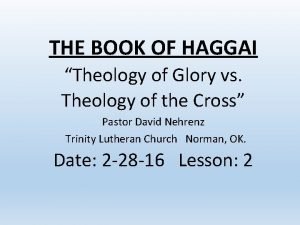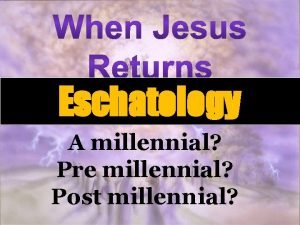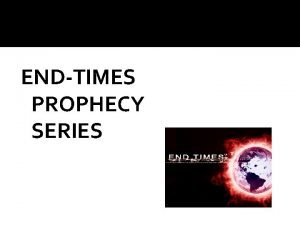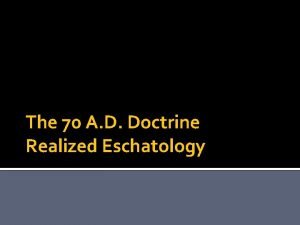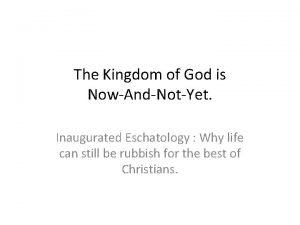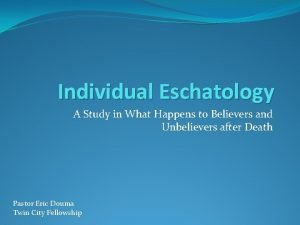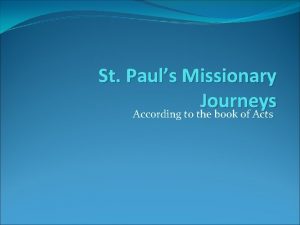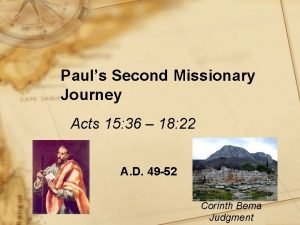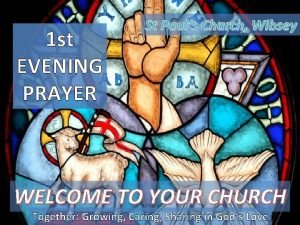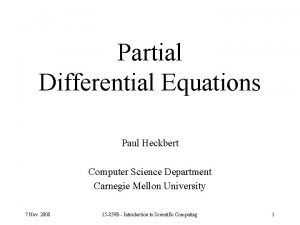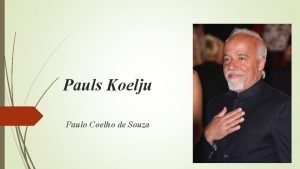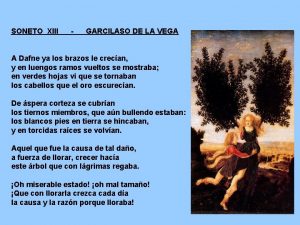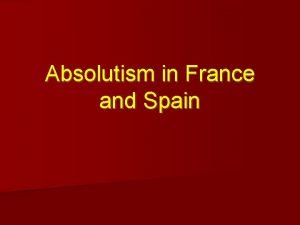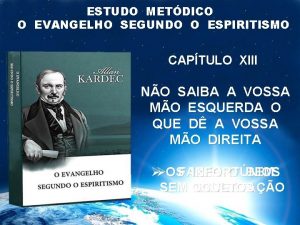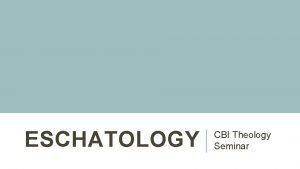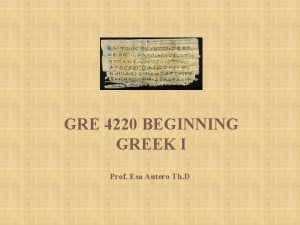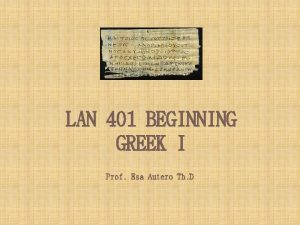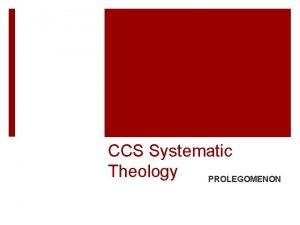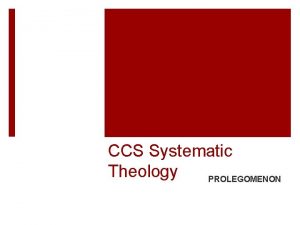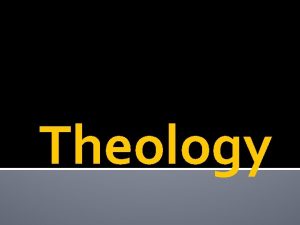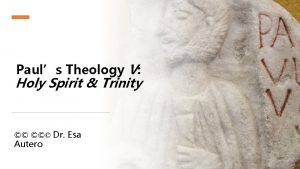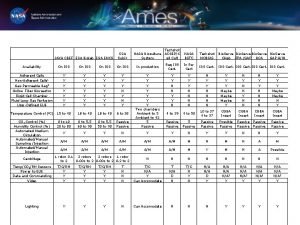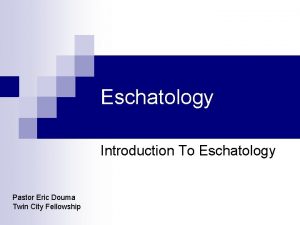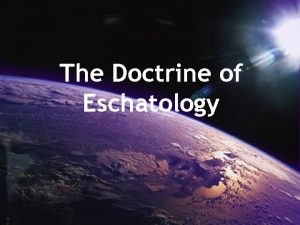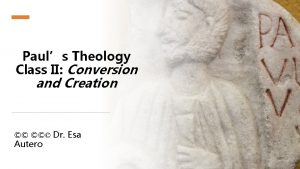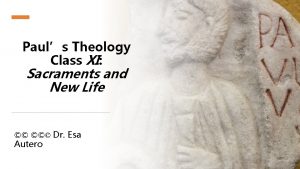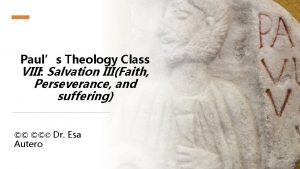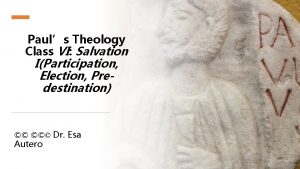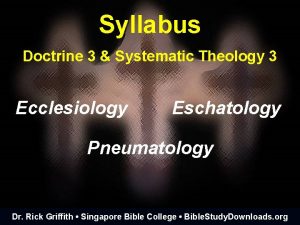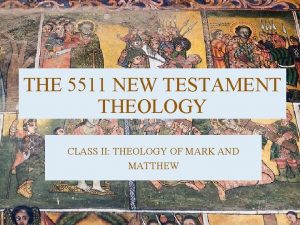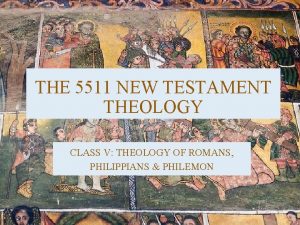Pauls Theology Class XIII Eschatology Dr Esa Autero

























- Slides: 25

Paul’s Theology Class XIII: Eschatology ©© ©©© Dr. Esa Autero

Problems with overrealized eschatology “resurrection already happened” (2 Tim 2: 18; 1 Cor 4: 8; 15: 12) Paul’s Theology • 1. 1 Eschatology and life after death – Introduction Implications of the overlap of ages to • Presence of eschatological age in Paul’s letters spiritual life (Rom 6: 6; • Eschatology in Judaism – present age and age to come 8: 1 -30; Col 3: 1 -10) • “The Most High made not one age but two aeons” (4 Ezra 7: 50) • Spirit as the sign of eschatological age (Ezek 36 -37) • Resurrection of the righteous and the wicked (Dan 12) • Paul follows a similar idea – ages divided by the coming of Christ • Resurrection of Christ and Spirit as “first fruit” mark the new age (1 Cor 15: 2023; Rom 8: 9 -11, 23) • “this age” – “age to come” overlap now (Rom 12: 2; 1 Cor 1: 20; 2: 6 -8; 3: 18; 2 Cor 4: 4; Gal 1: 4; Eph 5: 16; 6: 13; Phil 2: 15) • “the end of the ages has come” (1 Cor 10: 11; 7: 31) • Christ and the “fulness of time” (Gal 4: 4)

Paul’s Theology • Some important questions about eschatology (scholarly and popular) • What about death, intermediate state, and resurrection of the dead? • Events that take place before the End (Christ’s Parousia) • • • Does Paul talk about a sequence of events preceding Parousia? Final Judgment of the righteous and wicked • Is there degrees of judgment for the wicked and rewards for righteous? Millennial Kingdom and Eternal state • Does Paul indicate or imply an earthly Millennial kingdom? Rapture question – does Paul talk about “snatching away”? • Symbolical OR pre-, mid-, post-tribulation rapture Immediacy and/or delay of Parousia • Is there a development in eschatology within Paul’s epistles?

Paul’s Theology • 1. 2 Eschatology in Paul’s Theology • Eschatology a multidimensional phenomenon in Paul’s letters (and in NT) • Three types of eschatology found in Paul’s letters Christ’s final and • i) Futuristic eschatology visible victorious • Final Parousia (coming of the Lord Jesus to earth) coming to the earth • E. g. 1 Thess 4: 14 -18; 5: 1 -3; 2 Thess 1: 5 -10; 2: 1 -11; 1 Cor 15: 50 -57 Invasion of future • ii) Realized eschatology into the present – • Presence of the future in the here-and-now with emphasis on • E. g. Rom 8: 29 -30; Eph 2: 6; Col 1: 20 -23; 3: 1 -3 the victory Invasion of future • iii) Inaugurated eschatology – already-not-yet aspect into the present – • God’s future already invaded the present but not yet fully here with emphasis on the tension • E. g. Rom 8: 18 -25; 2 Cor 4: 16 -18

Paul’s Theology • Expectation of Christ’s return connected to Christian living • Live a life worthy of the Lord (moral life) (1 Cor 3: 10 -15; 2 Cor 5: 10; Eph 4: 1; Phil 1: 27) • Endure suffering, persecution, and hardship in light of future glory (Rom 8: 18; 2 Cor 4: 16 -18) • Be realistic (already-not-yet) – Lord’s power, human sinfulness (Rom 8: 1 -30) • Carry gospel eagerly into all the world (Rom 15: 16 -20; 1 Cor 15: 58) • Build God’s kingdom through church – loving neighbor, helping poor, and other ways of “anticipating” God’s kingdom on earth • View governing authorities/power as provisional – ideally God’s instruments, at worst Satan’s advocates (Rom 13: 1 -5; 2 Thess 2: 1 -12; 1 Cor 2: 7 -10) • Eagerly wait for Christ’s glorious Parousia when “every knee will bow…” and confess Jesus as Lord (Phil 2: 5 -11; 1 Cor 15: 55 -58)

Jews believed in resurrection and renewal of the cosmos with YHWH’s return to Zion Paul’s Theology • 1. 3 Eschatology and life after death in context • Hopelessness of pagans and philosophers regarding death and afterlife • Soul immortal – purification, punishment, and possible bliss after which the soul transmigrated to a new body (metempsychosis) – see Plato, Phaedrus 247 -9; Gita 2. 12 -22 • Stoics – doctrine of recurrence and ekpyrosis “our souls will continue for a long period but deny they will do so forever” (Cicero, Tusculan Disputations 1. 77) • Epicureans – soul perishes and ceases to exist • Popular belief – shadowy existence in Hades; afterlife in heaven or reincarnation • Cosmos as a whole – self-destruct; ekpyrosis/eternal existence Finality and irreversibility of bodily existence for all humans at death

Paul’s Theology παρουσι α and ε πιφα νεια used of king’s or dignitary’s triumphant arrival to a city AND gods’ appearance • Vocabulary regarding “Christ’s coming” • Four words that convey the idea of Christ’s coming • παρουσι α – “coming, presence, arrival” (1 Thess 4: 16; 1 Cor 15: 23; Phil 3: 20; cf. 1 Cor 16: 17 and 2 Cor 7: 6 of “coming” Titus and Paul’s companions in Corinth) • α ποκα λυψις – “revealing, revelation, unveiling, disclosure” (2 Thess 1: 7; Rom 8: 19; 1 Cor 1: 7) • ε πιφα νεια – “appearance, appearing” (2 Thess 2: 8; 1 Tim 6: 14; 2 Tim 4: 1, 8; Tit 2: 13 cf. 1 Tim 3: 16; 2 Tim 1: 10 [incarnation]) • φανερο ω (related to above) – “to become visible, manifest, appear, reveal” (Col 3: 4) • ε ρχομαι – come/go indicating Christ’s Parousia (1 Cor 4: 5; 11: 26) • τε λος – the end, culmination (1 Cor 1: 8; 15: 24; 2 Cor 1: 13; 10 Cor 1: 11) At Christ’s coming all powers will be defeated; death abolished; dead raised; sanctification completed; unbelievers judged; believers rejoice

Paul’s Theology • 2. 1 Parousia in Paul’s theology – select texts “if we believe Jesus died and rose…God will bring with Jesus those Is the movement “up” fallen asleep in Him” (1 Thess 4: 14) (to heaven? ) OR 15 For this we say to you by the word of the Lord, that we who are “down” (to earth? ) alive and remain until the coming of the Lord, will not precede those who have fallen asleep. 16 For the Lord Himself will descend from heaven with a shout, with the voice of the archangel and with the trumpet of God, and the dead in Christ will rise first. 17 Then we who are alive and remain will be caught up together with them in the clouds to meet the Lord in the air, and so we shall always be with the Lord. 18 Therefore comfort one another with these words. (4: 15 -18)

Paul’s Theology • Day of the Lord and Parousia (1 Thess 4: 13 -18) • Lord will descend – shout, voice of archangel & trumpet ἁρπαγησόμεθα ἐν • Sounds “loud” and looks “visible” νεφέλαις εἰς • Dead rise first and then the living to “meet in the air” ἀπάντησιν τοῦ • Be with the Lord forever κυρίου εἰς ἀέρα· • Is this a public or secret event? (4: 17) • After “meeting in the air” – come down to earth or go up to heaven? (4: 17) • Gk. eis apantesin kyriou – “honorable escort” (cf. Matt 25: 6; Acts 28: 15) implies continuous descend to earth • Timing of the parousia – like a thief in the night (5: 2) • Paul gives few details – context is pastoral

Paul’s Theology • Parousia and its development in 2 Thess 2: 1 -12 • False teaching or rumors (2: 2) not be quickly shaken…to the effect that the day of the Lord has come. 3 Let no one in any way deceive you… (2: 2 -3) • Overly eager expectation of parousia (2: 2) present affliction not “the end” • Signs before the end (2: 1 -12; cf. 1 Thess 5: 2) – that must take place first • Apostasy & revealing of the man of lawlessness/son of destruction (2: 3, 8) • “opposes/sets himself up against” God and objects of worship in temple • Comes w/ “activity of Satan” – power, signs, wonders, deception, wickedness • “what restrains…one who restrains” (2: 6 -7) • “mystery of lawlessness already working” (2: 3, 7) • Will be destroyed by the Lord “with breath of his mouth” (2: 8)

1) 1 Thess 4 – Christ comes back and those who died are not at disadvantage 2) 2 Thess 2 – Parousia preceded by certain events, so don’t be anxious 4 who opposes and exalts himself above every so-called god or object of worship, so that he takes his seat in the temple of God, displaying himself as being God. Paul’s Theology • What/who is the “lawless one”? (ο α νθρωπος τη ς α πωλει ας) α νομι ας, ο υι ο ς τη ς • Events in recent history (e. g. Caligula’s statue/alike) • Antichrist/beast (1 John 2: 18; 4: 3; 2 John 7; Rev 11: 7; 13: 1 -18) • What/who is the “restrainer”? (το κατε χον…ο κατε χων) • God, Holy Spirit; Satan • Angel Apollyon (Rev 9: 11) or Michael (Jude 9; Rev 12: 7) Does this imply • Church or prominent leader a literal • Gentile mission (cf. Mark 13: 10) Millennium? • Roman law and order (Rom 13: 1 -7) • Power and deception of Satan God sends • Set himself as God – in the temple (= church or Jerusalem Temple? ) “deception” (ε νε ργειαν • Powerful signs and deception allowed by God πλα νης) Augustine: “the meaning…completely escapes me” (City of God 20. 19)

1) 1 Thess 4 – Christ comes back and those who died are not at disadvantage 2) 2 Thess 2 – Parousia preceded by certain events, so don’t be anxious 3) 1 Cor 15 – Christ’s resurrection first, then resurrection of believers and finally death abolished; bodily resurrection is a reality Paul’s Theology 1) Christ’s (or imply) a literal resurrection 2) Resurrection of believers 15? * • Does Paul talk about Millennium in 1 Cor 23 But each in his own order: Christ the first fruits, after that those who are Christ’s at His coming, 24 then comes the end, when He hands over the kingdom to the God and Father, when He has abolished all rule and all 3) Christ authority and power. 25 For He must reign until He has put all His enemies 4) Final hands under His feet. 26 The last enemy that will be abolished is death. 27 For HEresurrection & Kingdom HAS PUT ALL THINGS IN SUBJECTION UNDERHIS FEET. But when He says, “Alldeath abolished to Father things are put in subjection, ” it is evident that He is excepted who put all things in subjection to Him. 28 When all things are subjected to Him, then the Son Himself also will be subjected to the One who subjected all things to Him, so that God may be all in all. (1 Cor 15: 23 -28) Is some sort of OR do the sequence of no: 2 -4 happen simultaneously? ** earthly Millennial reign implied here?

Paul’s Theology • 3. 1 Resurrection & intermediate state (1 Cor 15: 35 -58; 2 Cor 5: 1 -10; Phil 1: 21 -23; 3: 21) • Resurrection body (15: 35 -58) • Continuity & discontinuity b/w earthy body & resurrection body • Seed and plant – different types of “bodies” • Perishable – imperishable; Glory – dishonor; weakness – power • Sin/death – power & glory • Physical [psychikon] body – spiritual [pneumatikon] body • Mortal body – immortality • Adam (living being & from earth) – Christ (life-giving spirit & heaven) • Man of dust – man of heaven --- resurrection & “heaven-image” Mystery of the last trumpet, transformation & defeat of death/evil

For we know that if the earthly tent we live in is destroyed, we have a building from God, an eternal house in heaven, not built by human hands. 2 Meanwhile we groan, longing to be clothed instead with our heavenly dwelling, 3 because when we are clothed, we will not be found naked. 4 For while we are in this tent, we groan and are burdened, because we do not wish to be unclothed but to be clothed instead with our heavenly dwelling, so that what is mortal may be swallowed up by life. 5 Now the one who has fashioned us for this very purpose is God, who has given us the Spirit as a deposit, guaranteeing what is to come. (2 Cor 5: 1 -5) • Life after death (2 Cor 5: 1 -10) Paul’s Theology • Intermediate state (Phil 1: 21 -23), soul sleep or resurrection body (1 Cor 15)? η ε πι γειος • Earthly tent (groaning) – building from God/heavenly dwelling οι κοδομη ν ε κ θεου η μω ν οι κι α • Naked [in earthly tent] – clothed w/ heavenly dwelling (cf. 4: 16) ε χομεν, οι κι αν α χειροποι ητον ου θε λομεν του σκη νους ε νδημου ντες • Mortality – (eternal) life through the Spirit ε κδυ σασθαι α λλ αι ω νιον ε ν τοι ς ε ν τω • In the body [on earth] – home with the Lord ε [eternal ου ρανοι ς. πενδυ σlife] ασθαι ι να σω ματι καταποθη το θνητο ν ε κδημου μεν υ πο τη ς ζωη ς. • Earthly tent, naked, in the body = present life α πο του κυρι ο • υ Building/dwelling, life, “home w/ Lord” = “heaven” OR “resurrection” What is the meaning of these phrases? How to combine w/ other Pauline texts (1 Cor 15; 1 Thess 4; Phil 1: 20 -26; 3: 20 -21)

Bodies “sleep” in the grave (1 Cor 1518, 20; 1 Thess 4: 13; cf. Dan 12: 2) – awakened at resurrection Paul’s Theology Spirit/soul with Christ in heaven (Phil 1: 2024; 2 Cor 5: 5 -6) • The intermediate state and resurrection of the dead • 1) Resurrection body only at parousia (cf. 1 Cor 15; 1 Thess 4; Phil 3: 20 -21) • “being with the Lord” as intermediate non-bodily state (Phil 1: 20 -26) Most viable option • 2) Resurrection body received at death (cf. 2 Cor 5: 1 -10) • No intermediate states (cf. Phil 1: 21 -23) • 3) “Soul sleep” and resurrection at parousia (1 Cor 15) • Unconscious existence until Parousia and resurrection Practical exhortation to live godly life Judgment seat of Christ

Paul’s Theology • 3. 2 Final Judgment in Paul’s Theology (DPL, 516 -517; 819 -820)* • Terminology regarding judgment and rewards • κρι νω – to judge, form an opinion, decide (1 Cor 2: 2; 4: 5; 6: 1; Rom 2: 16) • κρι μα – judgment, sentence (Rom 2: 2; 13: 2) • κατακρι νω – condemn (1 Cor 11: 32) Final Day of • κατα κριμα – condemnation (Rom 5: 16) judgment familiar for Jews (1 En 45: 3; • δι κη/ε κδι κησις – justice, punishment (2 Thess 1: 8 -9) 4 Ezra 7: 33 -44) • ε κδικος – punisher (Rom 13: 4; 1 Thess 4: 6) • ο ργη – wrath (Rom 1: 18) < x 20 in Paul’s letters • φθορα ν – destruction, state of ruin (Gal 6: 8) • α νταποδι δωμι – pay back/in return, giving retribution (2 Thess 1: 6; Rom 12: 19) • α νταπο δοσις – reward, recompense (Col 3: 24; Rom 11: 9)

Judgment of unbelievers: i) “affliction”; “retribution”; “eternal destruction” “excluded from God’s presence” (2 Thess 1: 6 -9) ii) Receive God’s wrath & anger (Rom 2: 5, 8; Col 3: 6; 1 Thess 1: 10) iii) “Death” (Rom 6: 23) Paul’s Theology Specific descriptions of God’s eschatological wrath limited in Paul’s letters • Paul views judgment Day from Christological perspective God’s people involved in judging the world • Judgment by God (Rom 2: 5, 16; 14: 10; 2 Thess 1: 5) and angels (1 Cor 6: 1 -4) • Impartiality of God in judgment (Rom 2: 11) • Judgment by Christ (2 Thess 1: 9 -10//Isa 2: 10, 19, 21; 1: 6 -10; 1 Cor 4: 3 -5; 2 Cor 5: 10) – OT YHWH passages of final judgment applied to Christ • Criteria of judgment – Faith in the Gospel AND works • Punish “those who don’t know God…obey the gospel” (2 Thess 1: 8 -10) • Judgment according to works (Rom 2: 6; 1 Thess 4: 6) • Believers “resurrection” (1 Cor 15) “at home with the Lord” (2 Cor 5: 8) • Judgment according to works – evidence of changed life indicated by behavior and gospel obedience (Rom 2: 5 -11; 8: 1 -4; 1 Cor 3: 10 -15; 2 Cor 5: 10; Rom 14: 10) Only two types of people – saved and not saved

Two metaphors (1 Cor 3: 10 -15): 1) Gardening – plant-water-growth 2) Building – foundation-building “fire” burns, what remains = reward; builder escapes “through fire” Alternative explanation (1 Cor 3: 10 -15): Passage not about eschatological rewards Paul’s Theology • Are there specific rewards for faithful believers? On earth or in heaven? • Greatest reward of faithfulness – fellowship w/ Christ (Phil 3: 8 -11; 1 Cor 9: 24 -27) • Partial reward on earth w/ full reward in heaven (Phil 1: 21, 23; 3: 14) • Earthly rewards for faithfulness • Blessings in general (Gal 6: 7 -10) • Holistic and material blessings “all grace abound” – (2 Cor 9: 6 -9) • Negative – judgment (1 Cor 5: 5; 11: 27 -32; 1 Thess 4: 6) • Eschatological rewards – rewards as “crowns” in heaven? (1 Cor 3: 10 -15) • “Crown(s)” (Phil 4: 1; 1 Thess 2: 19; but see 2 Tim 2: 5; 4: 8; 1 Cor 9: 25) • Reward as “praise from God” – connected to hidden motives (1 Cor 4: 5) • “each rewarded acc. to labor” (1 Cor 3: 10 -15; 2 Cor 5: 10; Rom 14: 10) Focus on God who “gives growth” and enables good works – yet, individuals cooperate w/ the Spirit and receive rewards accordingly

When you send your Spirit, they are created, and you renew the face of the ground. (Ps 104: 30) Paul’s Theology Adoption, redemption of the body – image of “birth pangs” illustrates the tension b/w current existence and eschatological redemption • 4. 1 Restoration of all of creation (Rom 8: 18 -25; Col 1: 17 -20; 1 Cor 15: 20 -28; Eph 1: 10) • Restoration and transformation of all of creation • Resurrection of Christ connected to redemption of humans and all of creation 18 I consider that our present sufferings are not worth comparing with the glory that will is worth Creation 19 be revealed in us. For the creation waits in eager expectation for the children of God to redeeming – its be revealed. 20 For the creation was subjected to frustration, not by its own choice, but by renewal is connected to the will of the one who subjected it, in hope 21 that the creation itself will be liberated Christ’s resurrection from its bondage to decay and brought into the freedom and glory of the children of God. 22 We know that the whole creation has been groaning as in the pains of childbirth and redemption of right up to the present time. 23 Not only so, but we ourselves, who have the firstfruits of God’s the children Spirit, groan inwardly as we wait eagerly for our adoption to sonship, the redemption of our bodies. 24 For in this hope we were saved. But hope that is seen is no hope at all. Who hopes for what they already have? 25 But if we hope for what we do not yet have, we wait for it patiently. • Spirit renews and energizes believers as they groan and wait for redemption • Creation’s renewal connected to Spirit’s renewing it together w/ God’s children

Paul’s Theology • New • No

Paul’s Theology • New • No

Paul’s Theology • New • No

Paul’s Theology • New • No

Paul’s Theology • New • No

Paul’s Theology • New • No
 Theology of glory vs theology of the cross
Theology of glory vs theology of the cross Esa multimedia.esa.int./multimedia/virtual-tour-iss
Esa multimedia.esa.int./multimedia/virtual-tour-iss Pre vs post millennial
Pre vs post millennial End times views charts
End times views charts Realized eschatology definition
Realized eschatology definition Inaugurated eschatology
Inaugurated eschatology Individual eschatology
Individual eschatology St pauls missionary journeys
St pauls missionary journeys St pauls cathedral
St pauls cathedral The guy who sits behind marsha likes to play the drums
The guy who sits behind marsha likes to play the drums Map of paul's 2nd missionary journeys
Map of paul's 2nd missionary journeys St pauls monasterevin
St pauls monasterevin Nyandoche high school
Nyandoche high school Eportal st pauls
Eportal st pauls St pauls school wibsey
St pauls school wibsey Pde paula
Pde paula Alķīmiķis grāmata
Alķīmiķis grāmata St paul's second missionary journey map
St paul's second missionary journey map La meretrice che mai da l'ospizio
La meretrice che mai da l'ospizio Soneto a dafne
Soneto a dafne Louis xiii absolutism
Louis xiii absolutism Louis xiii accomplishments
Louis xiii accomplishments Capitulo xiii evangelho segundo espiritismo
Capitulo xiii evangelho segundo espiritismo /forum/ xiii
/forum/ xiii Louis xiv accomplishments
Louis xiv accomplishments Rimaxxx
Rimaxxx
